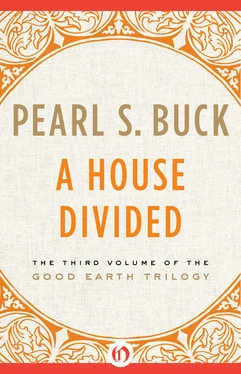Now when Mei-ling said these words, the lady looked at Yuan in a sort of triumph. And Yuan looking back at the two women, felt them leagued against him, women leagued against a man, and he could not bear it. There was something good about the old ways, after all, for it was the natural right thing that women should be wed and bear children and Mei-ling ought to want to marry, and there was some perversion in her that she would not. He thought to himself, angry in his manhood against these women, “It is a strange thing if women are like this nowadays! Whoever heard of a girl not marrying when the time comes? A very strange thing if young women are not to wed — a sorry thing for the nation and the next generation!” He thought, after all, how foolish even wisest women are, and he looked and met Mei-ling’s calm eyes and for once he thought them hard and cold to be so calm and sure, and he looked at her angrily. But the lady answered for her very certainly, “She shall not marry until she wishes. She shall use her own life as seems best to her, and you must bear it, Yuan.”
And the two women looked at him, even hostile in their new freedom, the younger held within the circle of the elder’s arm. … Yes, he must bear it!
Later in that gloomy day Yuan left his room where he had thrown himself upon the bed, and he went wandering through the streets, his mind all confusion once again. He had even wept and wept in his distress, and his heart sat in his side aching with an actual pain, as though it had been too hot and now was too cold and could not beat as it should.
What should he do now? Yuan asked himself in dreariness. Here and there about the streets he wandered, pushed and pushing, and seeing no one. … Well, and if joy was gone, his duty still remained. There was the debt he owed. At least alone he could fulfill his debt. He had his old father left to think of and he cast about to think what he could do, and where find a place to work and live, and save his wage to pay his debt. He would do his duty, he said to himself, and felt himself most hardly used.
So the day wore on and he wandered everywhere throughout that whole city, and it grew hateful to him. He hated all its foreignness, the foreign faces on the streets, the foreign garments even his own kind wore, the very garb upon his own body. It seemed to him at this one hour at least that old ways were better. He cried furiously to his cold, stopped heart, “It is these foreign ways that set our women to all this stubbornness and talk of freedom, so that they set nature aside and live like nuns or courtesans!” And he remembered with a special hatred that landlady’s daughter and her lewdness and Mary, whose lips had been too ready, and he blamed even them. At last he looked at every foreign female that he passed with such hatred that he could not bear them and he muttered, “I will get out of this city somehow. I will go away where I shall see nothing foreign and nothing new and live and find my life there in my own country. I wish I had not gone abroad! I wish I had never left the earthen house!”
And suddenly he bethought himself of that old farmer whom he once knew, who had taught him how to wield a hoe. He would go there and see that man and feel his own kind again, not tainted with these foreigners and all their ways.
At once he struck aside and took a public vehicle to hasten on his way, and when the vehicle was gone as far as it would, he walked on. Very far he walked that day searching for the land he once had planted and for the farmer and his home. But he could not find it until nearly evening, for the streets were changed and built up and full of people. When he reached at last the place he knew and recognized, there was no land to plant. There on the earth which only a few years ago had borne so fertilely, where the farmer had been proud to say his family had lived for a hundred years, now stood a factory for weaving silk. It was a great new thing, large as a village used to be, and the bricks new and red and many windows shone upon its roofs, and from its chimneys the black smoke gushed. Even as Yuan stood and looked at it, a shrieking whistle blew, the iron gates sprang open, and out of their vastness came a slow thick stream of men and women and little children, spent with their day’s labor and with the knowledge of tomorrow’s day to come and many days and many days which they must live like this one. Their clothes were drenched with sweat, and about them hung the vile stench of the dead worms in the cocoons from which the silk was wound.
Yuan stood looking at these faces, thinking half fantastically that one of them must be the farmer’s face, that he must be swallowed, even as his land had been, by this new monster. But no, he was not there. These were pale city folk, who crept out of their hovels in the morning and returned to them at night. The farmer had gone elsewhere. He and his old wife and their old buffalo had gone to other lands. Of course they had, Yuan told himself. Somewhere they lived their own life, stoutly as they ever had. And thinking of them he smiled a little, and for the moment forgetting his own pain, he went thoughtfully to his home. So would he also somehow find his own life.
TWO THINGS CAME ON the next day to shape Yuan’s life. The lady said to him very early in the morning, “My son, it is not fitting somehow that you live in this house for the time. Think yourself how hard it is for Mei-ling now to see you day after day knowing what is in your heart towards her.”
To this Yuan answered with anger left from his angers of the day before, “I do know very well, for so I feel also. I feel I want to be where I must not see her every day, too, and where I need not remember every time I see her or hear her voice that she will not have me.”
These words Yuan started bravely enough and in anger, but before he came to the end his voice trembled and however he tried to hold his anger and say he wanted to be where he could not see Mei-ling, yet when he thought of it he knew miserably that the truth was he had rather be where he could see her and hear her voice and this in spite of anything. But this morning the lady was her old mild self and now that she needed not to defend Mei-ling or the cause of women against men she could be gentle and comprehending, and she heard very well the tremble in Yuan’s voice and marked how he broke off speaking and fell very quickly to his bowl of food, for it was at table they met now, only Mei-ling did not come. So she said to comfort him, “This is your first love, son, and it comes hardly. I know what your nature is, and it is very much like your father’s and they all tell me he was like his mother who was a grave quiet soul, always holding too hard to those she loved. Yes, and Ai-lan is like your grandfather, and your uncle tells me she has his merry eye … Well, son, you are too young to hold so hard on anything. Go away and find a place you like and a work of some sort, and set yourself to your debt to your second uncle, and know young men and women and after a year or two—” She paused here and looked at Yuan, and Yuan waited, looking back. “After a year or two perhaps Mei-ling will be changed. Who can tell?”
But Yuan would not be hopeful. He said doggedly, “No, she is not a changing sort, mother, and I can see she cannot bear me. It came to me all in a moment that she was the one I wanted. I do not want the foreign sort of maid — I do not like them. But she is right for me. She is the kind I like — Somehow she is new and old, too—”
At this Yuan stopped again suddenly and filled his mouth with his food, and then could not swallow it because his throat was stiff with tears he was ashamed to shed, because it seemed a childish thing to weep for love, and he longed to think he did not care.
Читать дальше












